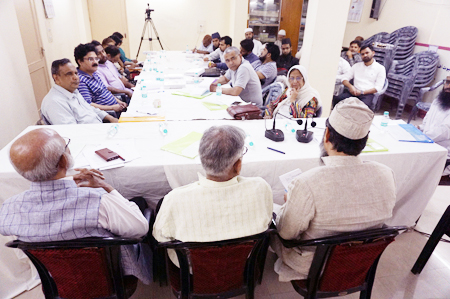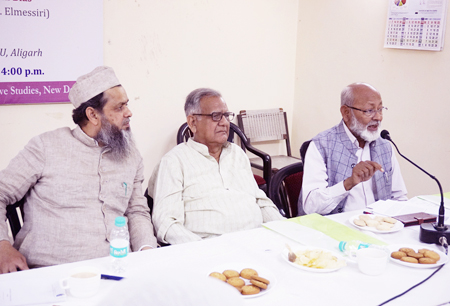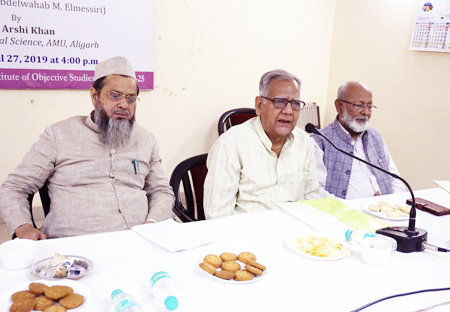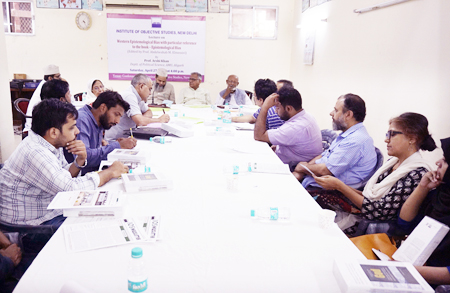IOS Lecture on Western Epistemological Bias
April 27, 2019 at Institute Building, 162, Jogabai, Jamia Nagar, New Delhi

A lecture on “Western Epistemological Bias” with particular reference to the book- Epistemological Bias in the Physical and Social Sciences, edited by Prof. Abdelwahab M. Elmessiri, and published by the Institute of Objective Studies was delivered at its conference room on April 27, 2019.
Prof. Arshi Khan, department of political science, AMU, Aligarh who delivered the lecture, held that the book under review was first published by the International Institute of Islamic Thought (IIIT). The purpose of the book was to discover bias.
The book also sought to counter the materialistic paradigms that resulted from colonisation and thus, could not be described as universal. He also said that these paradigms were based on the value system of the European continent. Calling for differentiation between the particular and the universal, he noted that even the West was now questioning the reason for their epistemological paradigms and the purpose of knowledge was being questioned. Singular and unilateral knowledge was also under question. Referring to Prof. Abdelwahab Elmessiri, he said that Elmessiri learnt about the identity of knowledge and culture, and propounded the theory of justice, which was later known as the theory of pluralism.

The paradigm he developed says “it is impossible for you to be biased”. In this regard, he termed the western paradigms as “imaginary constructs”. According to him, the reality was one, timeless, united and true. Western epistemologies kept on changing and material advancement of society was part of it. It was difficult to understand Western epistemology because of its being materialistic and excluding non-materialistic things like culture. Besides, it was egoistic, and like Brahminism preferred one over the other.
He said that Prof. Elmessiri, unlike Western theorists, never used the word God. Instead, he used “Almighty” for the Creator of the Universe. Elmessiri used taqwa, which was the reference point for Arabs. He talked of domestic culture, values, non-domestic culture, universal culture etc. Commenting on the internationalisation of cultural paradigms, Prof. Arshi Khan warned that globalisation was dangerous not only for the economy, but also for culture and identity, adding that values, ethics and morality were more important for humanity.
Muslims had not jettisioned their own paradigms which, among other things, included individuality of the human being. They created paradigms that were inclusive of their culture and paradigm was monotheistic. Referring to the theory of flux, he said that the Western paradigm did not look at absolute truth, but at relative truth. He observed that Elmessiri always held the view that the Western epistemology could not be universal.

The chairman, IOS, Dr. Mohammad Manzoor Alam, advised the younger generation of educated Muslims to read the works of the noted Islamic scholar Prof. Fuat Sezgin, who died recently. His 18-volume work, Contribution of Muslims to Science, was acclaimed worldwide. He informed that with a view to giving a befitting tribute to him, the IOS had planned to hold a conference on him sometime this year. He also suggested reading of Sir Jack Goody’s book The Theft of History which laid bare the Western bid to reconstruct the works of Orientalists. Laying stress on the need for studying the contribution of Muslims to social sciences, he said that Ibne Khaldun was treated as father of social sciences in Europe. The IOS had the privilege to be the first institution of its kind to publish a book on him. He questioned the audience if they had studied any of the books published by the Institute.
It was not machines, but the ideas taken from books that ruled the world. He urged scholars to read more and more books for spreading knowledge that knew no boundaries. He also called for developing a new university of paradigms. The moot question today was how to promote or improve the dignity of humanity at large. This included Muslims as well.
Voicing concern over the theft of the contribution of Muslims in various fields over the centuries, he emphasised the need for going deeper into knowledge as it generated the capability of questioning. Shallow knowledge provoked emotional response whereas deeper knowledge raised the level of questioning, he added.

Secretary General, IOS, Prof. Z.M. Khan, in his presidential remarks, described the works of Islamic scholars as part of the tradition to counter colonization, which was the worst part of history. He impressed upon scholars to create new paradigms without ego and bias. According to him, bias indicated that one had a pre-judged notion. Muslims lagged behind the West in pursuit of knowledge was clear from the fact that the Muslims did not make any significant contribution to knowledge during the last 200 years. This necessitated opening of new institutions that could give new paradigms. Calling upon Muslims to create an independent paradigm of enquiry, he urged them to come forward and make it a mission.

Earlier, the event began with the recitation of a Quranic verse by Hafiz Athar Husain Nadwi. Shah Ajmal Farooq Nadwi introduced the subject and conducted the proceedings. The lecture was attended by several Islamic scholars, university teachers, research scholars and prominent citizens.
|